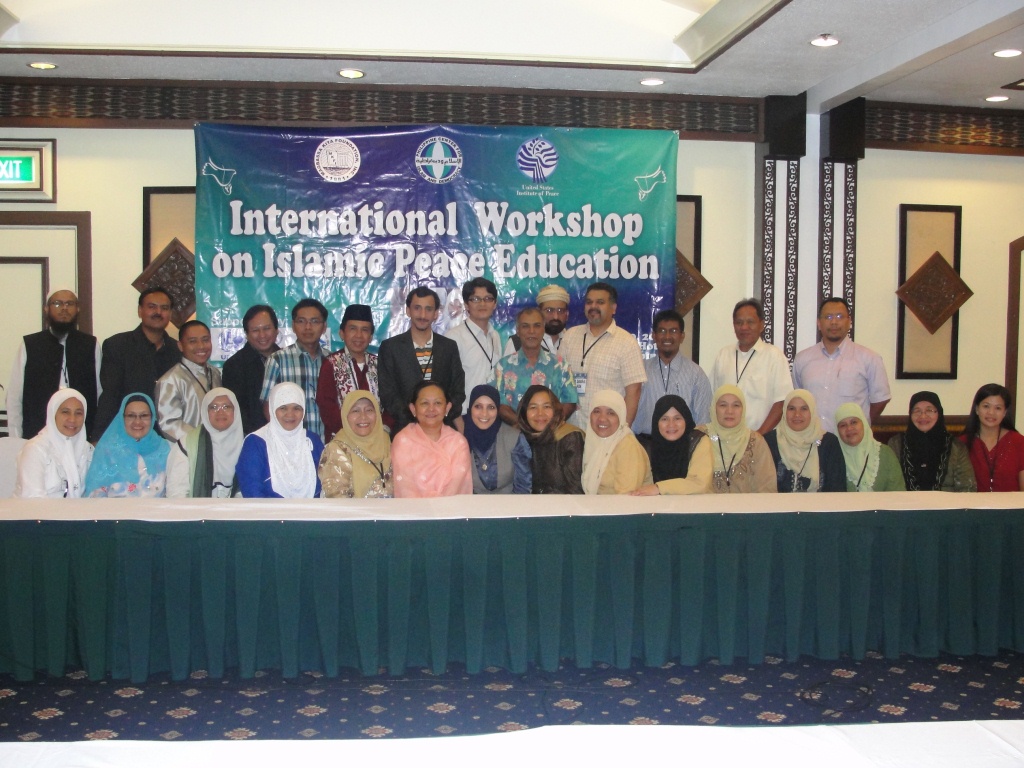Qamar-ul Huda discusses the International Islamic Peace Education Workshop organized by the U.S. Institute of Peace in partnership with the Philippine Center for Islam and Democracy (PCID) and Magbassa Kita Foundation Inc (MKFI).
From June 27- July 1, 2010, a group of thirty-five Muslim educators from eight countries came to Mindanao, the second largest island in the Philippines, for an international  workshop on Islamic Peace Education. The workshop was organized by the Philippine Center for Islam and Democracy (PCID) , Magbassa Kita Foundation Inc (MKFI), and the United States Institute of Peace (USIP). Qamar-ul Huda of the Religion and Peacemaking Center of Innovation is currently supervising two peace education programs overseas and organized this workshop with PCID.
workshop on Islamic Peace Education. The workshop was organized by the Philippine Center for Islam and Democracy (PCID) , Magbassa Kita Foundation Inc (MKFI), and the United States Institute of Peace (USIP). Qamar-ul Huda of the Religion and Peacemaking Center of Innovation is currently supervising two peace education programs overseas and organized this workshop with PCID.
The group of teachers, activists, members of nongovernmental organizations (NGOs), education specialists, and scholars discussed various models and approaches to Islamic peace education which are being employed by Muslim teachers in the classroom. As there is widespread perception of Islam as a religion of violence and intolerance, this workshop brought together Muslim educators to focus strategically on effectively using peace education curriculum to promote peacebuilding activities from an Islamic perspective. Qamar-ul Huda, senior program officer in the Religion and Peacemaking Program and one of the organizers, highlighted that while peace education is an established field and discipline in the West, Islamic peace education is fairly a new and innovative subject for Muslim educational institutions.
 Dr. Asna Husin of the Ar-Raniry State Institute of Islamic Studies in Aceh, and founder of the NGO Peace Education Program (Program Pendidkan Damia, or PPD) discussed how she cooperated with the local Ulama Council (of religious scholars) in conceptualizing and writing their peace manual and curriculum for the madrasa. Inspired by the Aceh Program Pendidkan Damia, PCID and MKFI collaborated together to write a similar textbook entitled "Islamic Peace Education Model," which is being taught in English in Muslim religious schools in the Philippines.
Dr. Asna Husin of the Ar-Raniry State Institute of Islamic Studies in Aceh, and founder of the NGO Peace Education Program (Program Pendidkan Damia, or PPD) discussed how she cooperated with the local Ulama Council (of religious scholars) in conceptualizing and writing their peace manual and curriculum for the madrasa. Inspired by the Aceh Program Pendidkan Damia, PCID and MKFI collaborated together to write a similar textbook entitled "Islamic Peace Education Model," which is being taught in English in Muslim religious schools in the Philippines.
Ms. Rahayu Mohammad from Singapore elaborated on how her peace education textbook cultivates tolerance, an Islamic identity of civic engagement, an ethos of pluralism, and stresses the importance of being caretakers of the world. Using classroom technology, instructional videos, role-playing, simulations, and student-oriented exercises, Rahayu emphasized the importance of instilling critical thinking skills in students while appreciating their Islamic heritage.
Qamar-ul Huda discussed the challenges in writing and implementing an Urdu peace education textbook for Pakistani madrasas. Huda has found that emphasizing cooperative learning methods, reflection sessions, and student-teacher engagement - all through a conflict resolution lens - has increased the desire to use the peace textbook.
The workshop addressed challenges facing peace educators, the issues of technical and intellectual capacity, limitations in resources, and ways to develop a comprehensive curriculum that analyzes principles, methods, approaches, and best practices of Islamic peacemaking and conflict resolution. The group discussed future meetings and formalizing a network.



